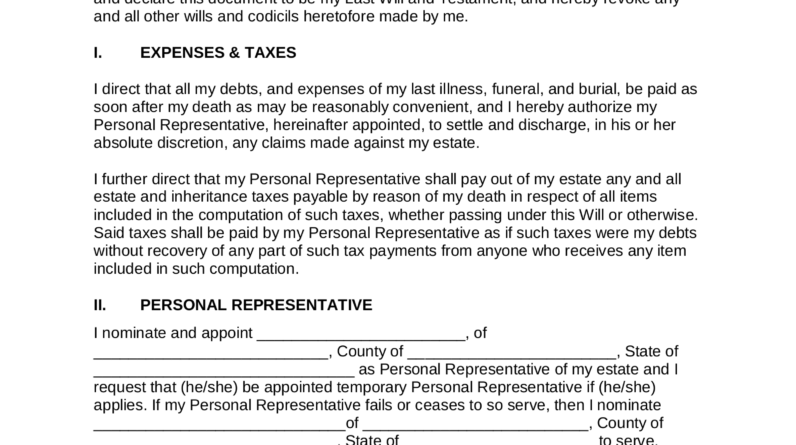
Are you someone who has been thinking about creating a will, but you’re not quite sure where to start? Well, you’re in luck! In this article, I’m going to provide you with some valuable information on how to create a will for free.
Creating a will is an important step in planning for the future and ensuring that your wishes are carried out after you’re gone. Many people think that creating a will is a complicated and expensive process, but it doesn’t have to be. In fact, there are several ways you can create a will for free, and I’ll be sharing some of those methods with you. Whether you’re young and just starting out or you’re older and have amassed some assets, it’s never too early or too late to create a will. So, let’s dive in and learn more about how you can create a will for free. Stay tuned for the rest of the article where I’ll be providing you with step-by-step instructions and resources to help you get started on creating your will.
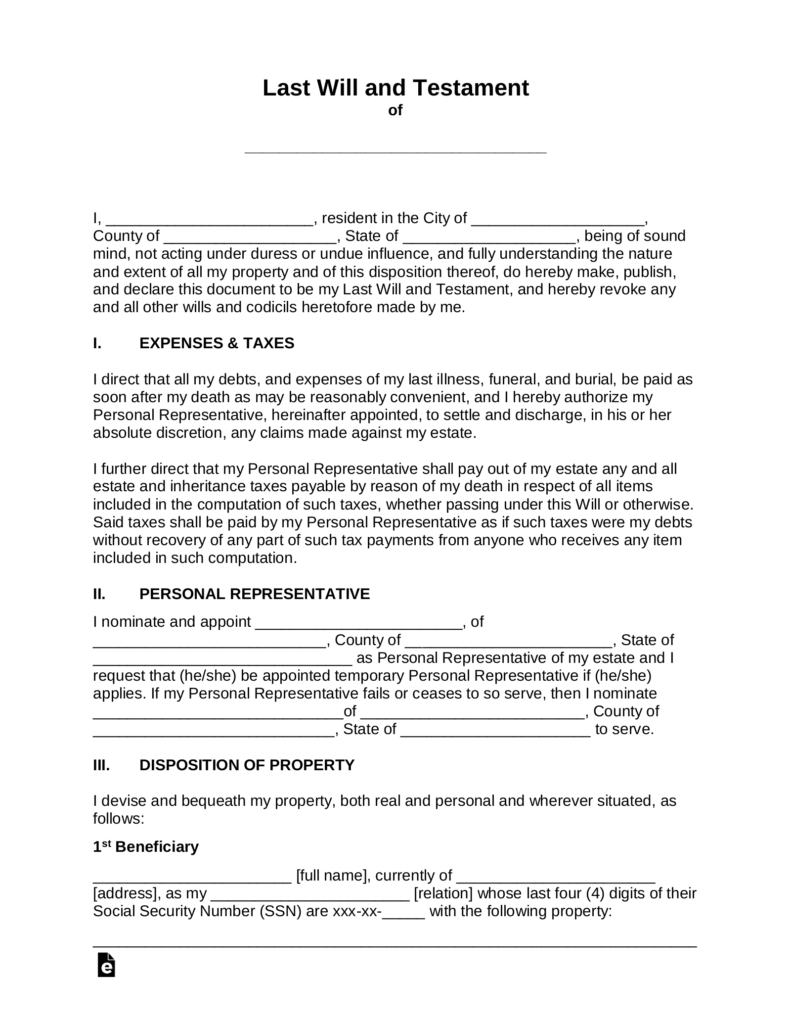
Table of Contents
Understanding the Importance of a Will
Why is having a will important?
Having a will is crucial because it allows you to have control over what happens to your assets and belongings after you pass away. Without a will, your property may be distributed according to state laws, which may not align with your wishes. Creating a will ensures that your assets are distributed as you desire and allows you to provide for your loved ones even after you are gone.
What is a will and what does it do?
A will is a legal document that outlines your wishes regarding the distribution of your property, the care of your minor children, and any other instructions you may have for after your death. It allows you to appoint an executor who will be responsible for ensuring that your wishes are carried out. A will serves as a roadmap for how your estate should be managed and who should benefit from it.
The benefits of creating a will
Creating a will offers several benefits. Firstly, it enables you to choose the individuals who will inherit your assets. Whether it’s family members, friends, or charitable organizations, you have the freedom to decide who should benefit from your estate. Secondly, a will allows you to appoint an executor who will oversee the distribution of your assets, ensuring that your wishes are followed. This can provide peace of mind, knowing that someone you trust is responsible for handling your affairs. Lastly, a will can help minimize conflicts and disputes among family members by stipulating your intentions clearly.
Determining the Content of Your Will
Identifying your assets and liabilities
Before you start creating your will, it’s important to identify all of your assets and liabilities. This includes properties, bank accounts, investments, vehicles, and any other valuable possessions you own. Additionally, take note of any debts or outstanding loans you may have. By having a clear understanding of your financial situation, you can accurately distribute your assets and address any outstanding obligations.
Deciding on beneficiaries
Deciding on beneficiaries is one of the key aspects of creating a will. These are the individuals or organizations who will inherit your assets. Consider your family members, friends, and any charity or cause that holds significance for you. Think about how you want your assets to be allocated among these individuals and make the necessary provisions in your will.
Appointing an executor
Appointing an executor is crucial as this individual will be responsible for managing your estate and ensuring that your wishes are carried out. Choose someone you trust completely, as they will have significant responsibilities, such as paying off debts, distributing assets, and handling any legal matters that arise. Discuss your decision with the person beforehand to ensure their willingness to take on this responsibility.
Naming guardians for minors
If you have minor children, it’s essential to name a guardian who will take care of them if something happens to you. This decision is critical as it will determine who will provide for and raise your children. Take the time to consider individuals who share your values and whom you believe would be suitable caregivers for your children.
Including specific bequests
In your will, you can make specific bequests, which are instructions for distributing specific assets or sentimental items to specific individuals. These could be family heirlooms, artwork, or any other cherished possessions that hold significant value to you or your loved ones. By including specific bequests, you ensure that these items are passed on to the individuals you choose.
Considering alternate beneficiaries
While it’s important to name primary beneficiaries in your will, it’s also wise to consider alternate or contingent beneficiaries. These individuals would inherit your assets if any of your primary beneficiaries pass away before you do or are unable to inherit for any reason. By including alternate beneficiaries, you ensure that your assets are distributed even if unforeseen circumstances arise.
Exploring Free Will-Making Options
Online will-making services
In today’s digital age, there are numerous online platforms that offer free will-making services. These platforms provide user-friendly templates and guides to help you create a will at no cost. They typically walk you through the process step-by-step, ensuring that you include all the necessary clauses and provisions. While it’s important to choose a reputable online service provider, using these services can save you time and money.
Software applications
Another option for creating a will for free is the use of software applications. These applications provide a more comprehensive approach to creating your will, allowing you to customize it according to your specific needs. They often include additional features such as legal advice, document storage, and the ability to update your will as needed. Utilizing software applications can provide a more personalized experience while still being cost-effective.
Templates and sample forms
If you are comfortable with a DIY approach, you can find free templates and sample forms online that will guide you through the process of creating a will. These templates typically provide a basic framework for your will, allowing you to fill in the necessary details. While using templates and sample forms requires more effort on your part, it is a viable option for those who prefer a hands-on approach and want to save on legal costs.
Researching Legal Requirements
Understanding state-specific laws
When creating a will, it’s crucial to familiarize yourself with the legal requirements specific to your state or jurisdiction. These laws vary from one location to another and may dictate certain formalities that must be followed for your will to be considered valid. Researching these requirements ensures that your will complies with the necessary legal standards and can be effectively executed.
Witness and notary requirements
In many jurisdictions, wills require witnesses and notarization to be considered valid. Typically, two or more witnesses must sign the will in the presence of the testator (the person creating the will) and each other. Additionally, notarization involves having a notary public authenticate the signatures on the will. Understanding your state’s witness and notary requirements is crucial to ensure the legal validity of your will.
Ensuring mental capacity and soundness
Another important legal requirement for a valid will is that the testator must have the mental capacity to create a will. This means that you must be of sound mind, understand the implications of creating a will, and be aware of the assets you are distributing. It’s essential to ensure that you meet these criteria when creating your will to prevent any challenges to its validity in the future.
Enlisting legal advice for complex situations
While free will-making options can be a cost-effective solution for many individuals, complex situations may require legal advice. If you have substantial assets, a complex family structure, or specific legal concerns, consulting with an attorney experienced in estate planning can provide you with the necessary guidance. They can advise you on the legal intricacies and help ensure that your will accurately reflects your intentions.
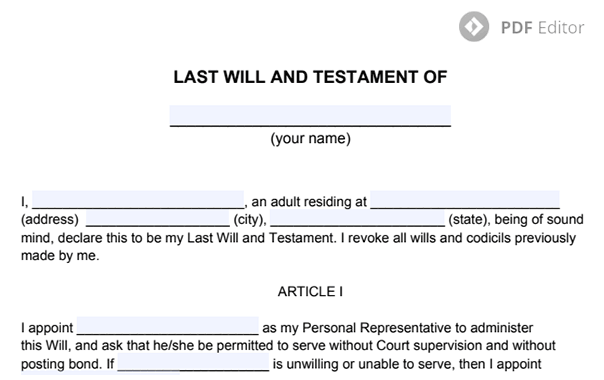
Gathering Necessary Information
Personal information and identification
When creating your will, ensure that you have all the necessary personal information readily available. This includes your full legal name, date of birth, and social security number. Additionally, gather any identification documents, such as your driver’s license or passport, as these may be required for legal purposes.
Inventory of assets and liabilities
To accurately distribute your assets, compile an inventory of all your belongings, including properties, bank accounts, investments, vehicles, and any other valuable possessions. Alongside each asset, note any associated debts, loans, or financial obligations. Having a comprehensive view of your assets and liabilities will enable you to make informed decisions when creating your will.
Identifying beneficiaries and alternate beneficiaries
Make a list of the individuals or organizations you wish to include as beneficiaries in your will. It’s important to be clear about who should inherit which assets. Additionally, consider and identify any alternate beneficiaries to ensure that your assets are still distributed as intended, even if your primary beneficiaries are unable to inherit.
Choosing an executor and guardians
Think carefully about whom you trust to handle your affairs after your passing. Choose an executor who will be responsible for managing your estate, including distributing assets and settling any outstanding debts. If you have minor children, determine and name suitable guardians who will care for them in the event of your untimely demise.
Drafting and Writing Your Will
Using clear and precise language
When writing your will, it’s crucial to use clear and precise language to ensure there is no ambiguity regarding your intentions. Avoid using vague or open-ended terms that could lead to misinterpretation. Be as specific as possible when describing your assets, beneficiaries, and any special instructions you may have.
Including essential clauses and provisions
A well-drafted will should include essential clauses and provisions to address important aspects. These may include a residuary clause, which distributes any remaining assets not explicitly mentioned in the will, and a clause empowering your executor to take necessary actions. Depending on your situation, you may also want to include provisions related to trusts, charitable donations, or funeral arrangements.
Avoiding ambiguous or contradictory terms
To prevent confusion or potential legal challenges, it’s important to avoid using ambiguous or contradictory language in your will. Be consistent and ensure that all terms are clear, concise, and in alignment with your intentions. Seek clarification if needed and consult legal resources or professionals to ensure your will accurately reflects your wishes.
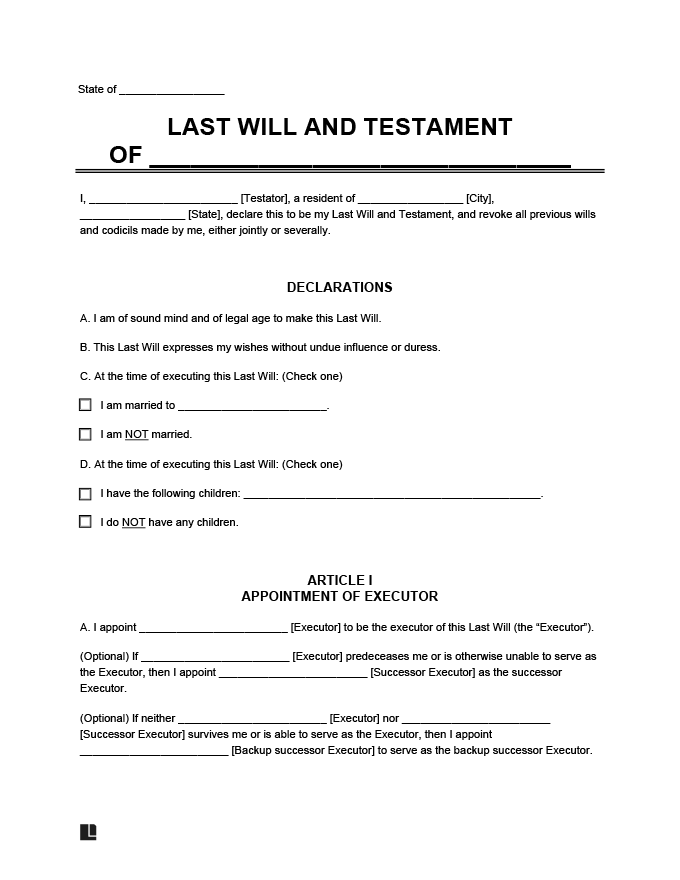
Reviewing and Revising Your Will
Understanding the need for periodic reviews
Creating a will is not a one-time process. It’s essential to periodically review your will to ensure it reflects any changes in your family structure, finances, or personal circumstances. Life events such as births, deaths, marriages, divorces, or significant changes in your assets may necessitate updates to your will. Regularly reviewing your will helps ensure that your wishes are always up to date.
Updating your will for major life changes
When major life changes occur, it’s crucial to update your will accordingly. For example, if you have a child, get divorced, or acquire new assets, you may need to make changes to your existing will. Failing to update your will in these situations may result in unintended consequences or your assets being distributed contrary to your wishes.
Revoking or amending your will
If you wish to revoke or amend your will, it’s important to follow the proper legal steps. A new will can revoke your previous will entirely or amend specific provisions. To ensure your revised intentions are properly documented, it’s advisable to consult with an attorney or utilize legal resources to guide you through the process.
Executing and Storing Your Will
Validating your will through proper execution
For your will to be legally valid, it must be properly executed. This typically involves signing the will in the presence of witnesses who are not beneficiaries and who then sign the document as well. Follow the legal requirements specific to your jurisdiction to ensure that your will is executed correctly. Improper execution may render your will invalid and your intentions disregarded.
Choosing witnesses and a notary public
When selecting witnesses for your will, choose individuals who are not named as beneficiaries to avoid any conflicts of interest. Additionally, in certain jurisdictions, having your will notarized by a notary public can provide an added layer of legal validity. Follow the witness and notary requirements specific to your state or jurisdiction to ensure the proper execution of your will.
Storing your will securely
Once you have executed your will, it’s crucial to store it securely. Choose a safe and accessible place, such as a locked fireproof box or a safe deposit box at a bank. Inform your executor, trusted family members, or your attorney of the location and provide them with copies of your will to ensure it can be easily accessed when needed.
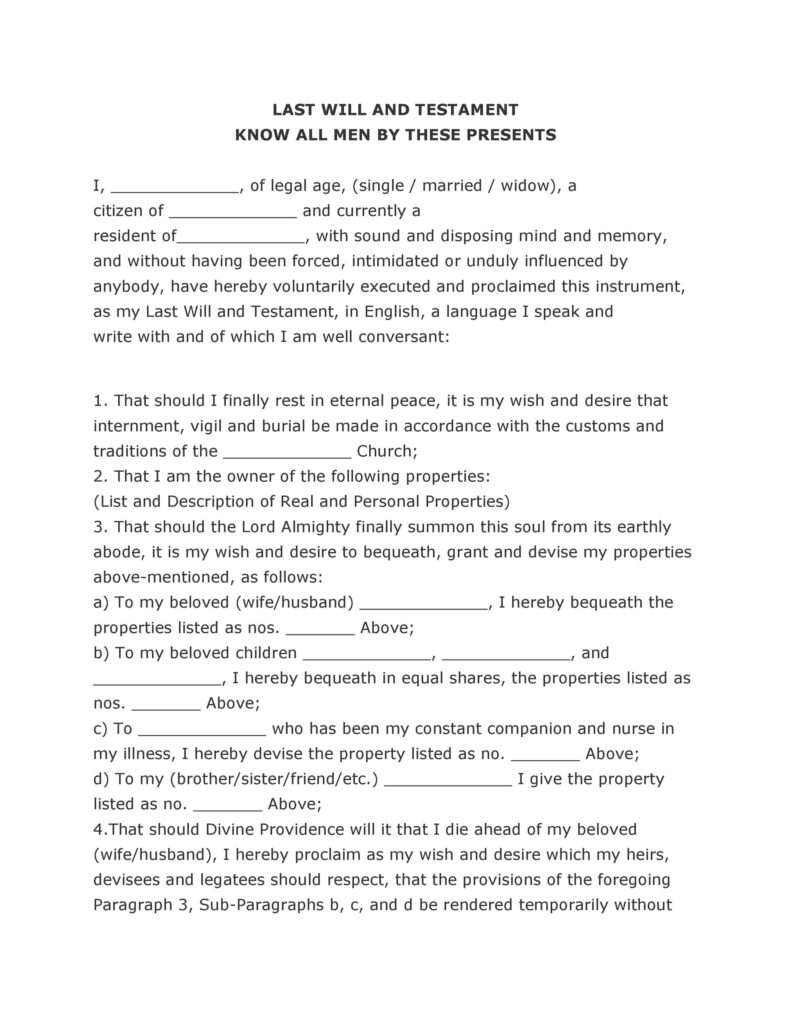
Informing Relevant Parties
Communicating the existence of your will
To ensure that your will is effectively executed, it’s important to inform relevant parties of its existence. Notify your executor, trusted family members, or your attorney about the location of your will and provide them with copies. This ensures that when the time comes, your executor can locate your will and initiate the distribution of your assets according to your wishes.
Sharing relevant details with beneficiaries
While it may not be necessary to share the exact contents of your will with your beneficiaries during your lifetime, it can be helpful to provide them with a general overview. By doing so, you can manage their expectations and prevent any surprises or disputes after your passing. Sharing relevant details can also allow for open discussions regarding your intentions, particularly if you have made specific bequests or named alternate beneficiaries.
Informing your executor and guardians
Once you have designated an executor and named guardians for your minor children, it’s important to inform them of their roles and responsibilities. Have open conversations with your chosen executor and guardians, explaining your wishes regarding the management of your estate and the care of your children. Provide them with any necessary instructions or guidance, and ensure that they have a clear understanding of your expectations.
Conclusion
Creating a will is a crucial step in ensuring that your assets are distributed as you desire and that your loved ones are provided for after your passing. While the process may seem daunting, there are several cost-effective options available to create a will for free. Whether you choose to use online will-making services, software applications, or templates and sample forms, these tools can guide you through the process while saving you time and money. By understanding the importance of creating a will, determining its content, researching legal requirements, gathering necessary information, drafting the document, reviewing and revising it periodically, executing and storing it securely, and informing relevant parties, you can create a will that accurately reflects your intentions and provides peace of mind for you and your loved ones.

